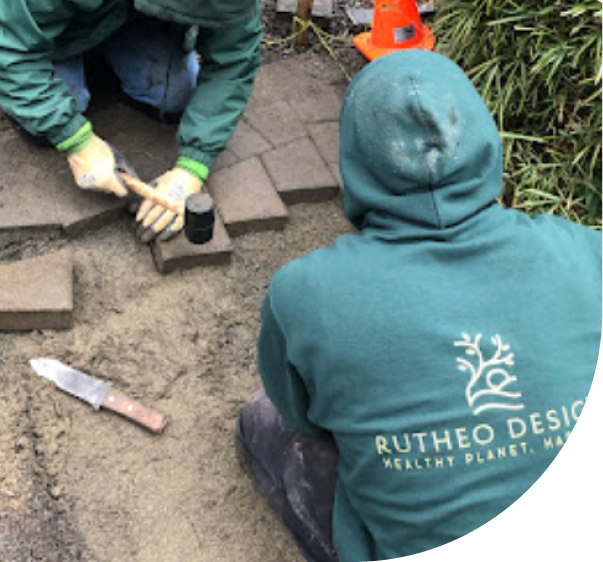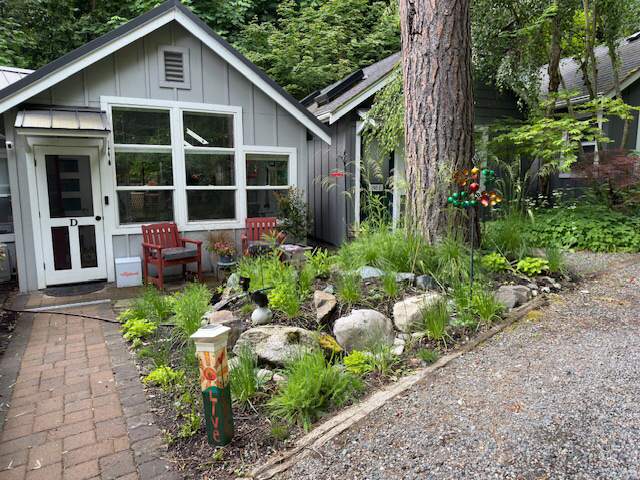
At Rutheo Designs, we create therapeutic garden spaces that promote relaxation, healing, and accessibility while remaining rooted in sustainable landscaping principles. Thoughtfully designed therapeutic gardens harness the power of nature to support mental and physical well-being, integrating elements like sensory plantings, shaded retreats, and water features that encourage mindfulness. By incorporating raised garden beds, wide pathways, and ergonomic seating, we ensure that these spaces are fully accessible for individuals of all mobility levels. Our approach prioritizes biodiversity, using native plants that attract pollinators and enhance the ecological balance while requiring minimal maintenance. Whether designing for private residences, healthcare facilities, or community spaces, we tailor each garden to provide a harmonious blend of functionality and natural beauty.
Therapeutic gardens are rooted in the concept that nature has a profound impact on mental and physical well-being. Research in biophilic design and environmental psychology has demonstrated that exposure to green spaces reduces cortisol levels, the hormone associated with stress, leading to lower anxiety and improved mood. The presence of natural elements like trees, plants, and water stimulates the parasympathetic nervous system, which helps regulate relaxation and emotional stability.
Studies on stress reduction and cognitive restoration show that time spent in natural environments can enhance focus and memory retention. Green spaces provide relief from mental fatigue by offering a restorative setting where individuals can disconnect from the pressures of daily life. This effect is particularly beneficial for individuals recovering from trauma or those managing high-stress lifestyles. Incorporating therapeutic gardens into healthcare settings, workplaces, and urban environments can contribute to improved well-being and overall quality of life.
Therapeutic gardens provide a structured yet calming environment that supports mental health by offering a retreat from stressors. Gardening has been linked to anxiety and depression relief, as it encourages mindfulness, lowers stress levels, and fosters a sense of purpose. Engaging with plants, whether through tending to them or simply sitting among them, promotes relaxation and emotional grounding.
Sensory engagement plays a key role in mood enhancement. The scent of lavender can have a calming effect, while bright flowers like marigolds or sunflowers uplift the spirit. The act of touching textured leaves, hearing the rustling of ornamental grasses, or feeling the warmth of the sun while gardening can create a multisensory experience that nurtures emotional resilience. Therapeutic gardens encourage mindfulness, helping individuals focus on the present moment, reducing intrusive thoughts, and promoting a greater sense of balance and clarity.
Gardening is not only mentally restorative but also physically beneficial. Therapeutic gardens support rehabilitation by encouraging gentle movement and fine motor skill development. Raised garden beds and ergonomically designed planting areas make it easier for individuals with limited mobility to participate in gardening activities without strain.
Movement-friendly garden layouts encourage physical activity in a way that is low-impact yet effective. Tasks like digging, planting, and watering help improve muscle strength, flexibility, and coordination. For older adults or those recovering from injuries, these activities promote dexterity and mobility while reducing the risk of stiffness. The combination of physical engagement with the calming properties of nature creates a holistic approach to wellness.
A well-designed therapeutic garden prioritizes accessibility so that people of all abilities can engage with the space. Raised garden beds provide a practical solution for individuals using wheelchairs or those with limited mobility, allowing for comfortable interaction with plants without excessive bending or reaching.
Pathways are designed to be smooth and wide, ensuring safe navigation for wheelchairs, walkers, or those with limited balance. Materials like decomposed granite or permeable pavers offer a firm, stable surface that remains accessible in all weather conditions. Seating and resting areas are strategically placed to provide comfort and encourage prolonged enjoyment of the garden.
A well-planned therapeutic garden incorporates elements that engage all the senses, creating a truly immersive experience. Texture-rich plants, such as lamb’s ear or ferns, provide tactile engagement, while fragrant flowers and herbs stimulate the sense of smell, offering both calming and invigorating effects.
Color psychology plays a role in emotional well-being, with blues and greens offering tranquility, while warm colors like oranges and yellows evoke energy and positivity. Strategic placement of colorful foliage and flowers enhances visual interest and creates a dynamic yet harmonious atmosphere.
Water is a central element in therapeutic gardens due to its calming and meditative properties. The sound of running water from fountains or small waterfalls can help mask urban noise pollution and create a peaceful atmosphere.
To ensure accessibility, water features should be designed with varied interaction points, such as low-level fountains for seated visitors or gently sloping streambeds that allow for sensory engagement. Sustainable water conservation strategies, including recirculating pumps and rainwater collection systems, maintain efficiency while supporting environmental stewardship.
Designed to enhance cognitive function and emotional well-being, sensory gardens are particularly beneficial for individuals with dementia or sensory processing disorders. Plants that evoke nostalgia, such as heirloom roses or herbs commonly used in traditional cooking, help stimulate memory and create meaningful connections to the past.
Interactive elements, like wind chimes, textured pathways, or edible plants, provide engagement opportunities that encourage exploration and mental stimulation. These features transform the garden into a safe, comforting space where individuals can experience sensory-rich moments that reinforce cognitive function.
Healing gardens are intentionally designed to provide a sanctuary for relaxation, meditation, and emotional recovery. They emphasize natural materials, such as wooden benches, stone pathways, and native plantings, to create an organic and restorative environment.
Shaded areas and secluded retreat spaces allow for quiet reflection, making these gardens ideal for stress relief and mindfulness practices. A carefully curated selection of plants, such as chamomile for relaxation or aloe vera for its healing properties, reinforces the theme of restoration and self-care.
Gardening offers a direct connection between nutrition and healing. Therapeutic edible gardens provide fresh, nutrient-rich produce while also supporting well-being through the act of gardening itself. Raised beds simplify planting and harvesting, making these gardens highly accessible.
Herbs like mint, basil, and thyme offer both culinary and medicinal benefits, supporting holistic wellness. These gardens encourage sustainable food practices while fostering a sense of self-sufficiency and engagement with nature.

At Rutheo Designs, we are dedicated to transforming your outdoor spaces into beautiful, sustainable landscapes that reflect your vision and the unique character of the Seattle area. Whether you’re looking to enhance your garden with native plants, need expert advice on water-efficient irrigation systems, want to explore custom hardscaping for your outdoor living space, or discuss a comprehensive landscape design, our team is here to assist you every step of the way. We offer services in native plant landscaping, water-efficient irrigation, custom landscape design, and hardscaping solutions tailored to your goals and the local environment. Every project is unique, and we take the time to listen to your needs and offer personalized solutions that align with both your aspirations and Seattle’s natural surroundings.
We invite you to reach out to us to start the conversation about your landscaping needs. You can contact us by email at connect@rutheodesigns.com or give us a call at (360) 844-2989. Whether you have specific questions or are ready to schedule a consultation, we’re eager to help you bring your outdoor vision to life with the care and expertise that Rutheo Designs is known for.